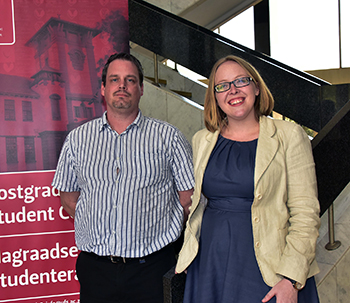Latest News Archive
Please select Category, Year, and then Month to display items
20 December 2021
|
Story Igno van Niekerk
|
Photo Igno van Niekerk
![]() Dr Samantha Potgieter, Senior Lecturer in the Department of Internal Medicine and Dr Nicholas Pearce, Senior Lecturer in the Department of Surgery comment on their team members’ commitment and determination during the pandemic.
Dr Samantha Potgieter, Senior Lecturer in the Department of Internal Medicine and Dr Nicholas Pearce, Senior Lecturer in the Department of Surgery comment on their team members’ commitment and determination during the pandemic.
On the forefront of the battle against the COVID-19 pandemic, two UFS doctors are leading a team of inspired healthcare workers in a superhuman effort to make a positive difference.
With the pandemic in its second year and the recurring challenges of new waves and strains consistently in the news, one would expect the doctors to be tired. However, quite the opposite is true. Upon entering the office where Dr Samantha Potgieter, Senior Lecturer in the Department of Internal Medicine and Dr Nicholas Pearce, Senior Lecturer in the Department of Surgery are in a meeting with colleagues, the debate is vibrant; an energetic sense of mission.
Miraculously succeeded
My brief is to collect stories and experiences they’ve had over the past 18 months at the Tumelo ward for general and high-care patients, where the team has miraculously succeeded in not running out of oxygen or ventilators, despite handling high volumes of patients from the Free State and Northern Cape. “We saw those pictures of piled-up bodies in Italy. We were committed to avoiding that at all costs. And we did.”
Success stories? First mentioned are their team members’ commitment and determination. The team had to stand in when families could not support dying patients. “They did not die alone. Our team was there.”
“Really sad and frustrating are the deaths that could have been prevented. Unvaccinated patients. They arrive ill, wanting to know if they can get it. Too late...” – Dr Nicholas Pearce
Then came hope
Sad stories? The past year has had its share of sad stories. “Someone comes in during the morning, needs oxygen, in the afternoon they are in ICU, then ventilator – and then they die. We’ve never faced anything like this before.”
Then came hope. Vaccines. Dr Pearce is in charge of the vaccination site at Universitas Hospital. “Really sad and frustrating are the deaths that could have been prevented. Unvaccinated patients. They arrive ill, wanting to know if they can get it. Too late ...” He opens his cell phone – shares the stats. “We can handle 2 000 vaccinations a day. At the moment about 250 comes in.” He shakes his head.
“We can beat this virus, but we need to stand together ...”
National 3MT competition held at UFS
2017-03-29

The two winners of the Three minute thesis
competition, Andrew Verrijdt (left) and
Kerryn Warren (right).
Photo: Charl Devenish
From Neanderthal hybrid children to eating corn silk as a way of managing kidney diseases, the National Three Minute Thesis competition (3MT) captivated the mind.
“We brought the competition to South Africa and hosted the local, regional, and national competitions for the past few years,” said Dr Emmie Smit, organiser of the event. It is an opportunity to raise the profile of postgraduate research and to develop a cross-disciplinary student community to effectively communicate research to a wide audience. The event was founded by the University of Queensland, Australia. The third national 3MT competition took place at the University of the Free State (UFS) on Friday 24 March 2017.
Three minutes and one slide
During the competition, participants had three minutes to explain their master’s or doctoral research and one static PowerPoint slide could be used. “It is very important that this slide works for you. There must be some way the information on the slide connects to what you present,” said Dr Henriette van den Berg, Director of the Postgraduate School at the UFS.
Winners grateful for opportunity
“It is an honour and a drive. It is very nice to have this sort of thumbs up,” said Kerryn Warren, winner of the Science category. Her research title was, What did a Human-Neanderthal Child Look Like? “I have been looking at the hybrids between different species and subspecies of mice in order to use them as a model to find out what human hybrids looked like.”
The presentation by Andrew Verrijdt, winner of the Humanities category, entitled Hiding in the Deep: Anonymous Websites for Paedophiles on the ‘Darknet’, gave a glimpse into the mysterious and dangerous realm of the dark web. “I am grateful for the opportunity. Primarily because I think it’s an important topic, and society will benefit by getting the word out there as it is a sensitive topic,” he said. The two winners, both from the University of the Cape Town, won R15 000 each. A further R30 000 of prize money went to the four runners-up.